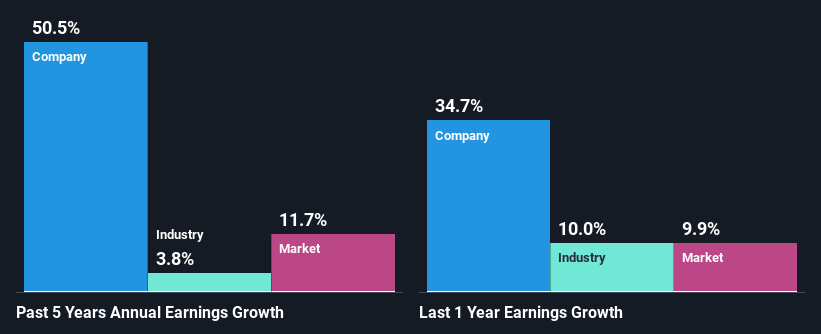Stock Analysis
- Saudi Arabia
- /
- Wireless Telecom
- /
- SASE:7020
Declining Stock and Decent Financials: Is The Market Wrong About Etihad Etisalat Company (TADAWUL:7020)?

With its stock down 5.2% over the past month, it is easy to disregard Etihad Etisalat (TADAWUL:7020). However, the company's fundamentals look pretty decent, and long-term financials are usually aligned with future market price movements. Specifically, we decided to study Etihad Etisalat's ROE in this article.
Return on equity or ROE is an important factor to be considered by a shareholder because it tells them how effectively their capital is being reinvested. Put another way, it reveals the company's success at turning shareholder investments into profits.
View our latest analysis for Etihad Etisalat
How Is ROE Calculated?
The formula for return on equity is:
Return on Equity = Net Profit (from continuing operations) ÷ Shareholders' Equity
So, based on the above formula, the ROE for Etihad Etisalat is:
13% = ر.س2.2b ÷ ر.س18b (Based on the trailing twelve months to December 2023).
The 'return' is the income the business earned over the last year. So, this means that for every SAR1 of its shareholder's investments, the company generates a profit of SAR0.13.
Why Is ROE Important For Earnings Growth?
We have already established that ROE serves as an efficient profit-generating gauge for a company's future earnings. We now need to evaluate how much profit the company reinvests or "retains" for future growth which then gives us an idea about the growth potential of the company. Generally speaking, other things being equal, firms with a high return on equity and profit retention, have a higher growth rate than firms that don’t share these attributes.
Etihad Etisalat's Earnings Growth And 13% ROE
It is quite clear that Etihad Etisalat's ROE is rather low. An industry comparison shows that the company's ROE is not much different from the industry average of 11% either. However, the exceptional 51% net income growth seen by Etihad Etisalat over the past five years is pretty remarkable. Given the low ROE, it is likely that there could be some other reasons behind this growth as well. For instance, the company has a low payout ratio or is being managed efficiently.
We then compared Etihad Etisalat's net income growth with the industry and we're pleased to see that the company's growth figure is higher when compared with the industry which has a growth rate of 3.8% in the same 5-year period.

The basis for attaching value to a company is, to a great extent, tied to its earnings growth. It’s important for an investor to know whether the market has priced in the company's expected earnings growth (or decline). This then helps them determine if the stock is placed for a bright or bleak future. What is 7020 worth today? The intrinsic value infographic in our free research report helps visualize whether 7020 is currently mispriced by the market.
Is Etihad Etisalat Making Efficient Use Of Its Profits?
Etihad Etisalat's three-year median payout ratio is a pretty moderate 49%, meaning the company retains 51% of its income. This suggests that its dividend is well covered, and given the high growth we discussed above, it looks like Etihad Etisalat is reinvesting its earnings efficiently.
Besides, Etihad Etisalat has been paying dividends for at least ten years or more. This shows that the company is committed to sharing profits with its shareholders. Upon studying the latest analysts' consensus data, we found that the company's future payout ratio is expected to rise to 71% over the next three years. However, the company's ROE is not expected to change by much despite the higher expected payout ratio.
Conclusion
Overall, we feel that Etihad Etisalat certainly does have some positive factors to consider. Despite its low rate of return, the fact that the company reinvests a very high portion of its profits into its business, no doubt contributed to its high earnings growth. That being so, a study of the latest analyst forecasts show that the company is expected to see a slowdown in its future earnings growth. Are these analysts expectations based on the broad expectations for the industry, or on the company's fundamentals? Click here to be taken to our analyst's forecasts page for the company.
Valuation is complex, but we're helping make it simple.
Find out whether Etihad Etisalat is potentially over or undervalued by checking out our comprehensive analysis, which includes fair value estimates, risks and warnings, dividends, insider transactions and financial health.
View the Free AnalysisHave feedback on this article? Concerned about the content? Get in touch with us directly. Alternatively, email editorial-team (at) simplywallst.com.
This article by Simply Wall St is general in nature. We provide commentary based on historical data and analyst forecasts only using an unbiased methodology and our articles are not intended to be financial advice. It does not constitute a recommendation to buy or sell any stock, and does not take account of your objectives, or your financial situation. We aim to bring you long-term focused analysis driven by fundamental data. Note that our analysis may not factor in the latest price-sensitive company announcements or qualitative material. Simply Wall St has no position in any stocks mentioned.
About SASE:7020
Etihad Etisalat
Etihad Etisalat Company, through its subsidiaries, establishes and operates mobile wireless telecommunication and fiber optic networks in the Kingdom of Saudi Arabia.
Good value with proven track record.

